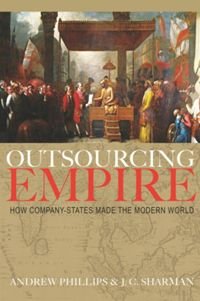
Ebook: Outsourcing Empire: How Company-States Made the Modern World
Author: J C Sharman and Andrew Phillips
- Tags: The Company-State, Philip Stern, Between Monopoly and Free Trade, Emily Erikson, Freedom’s Debt, William Pettigrew, The Company and the Shogun, Adam Clulow, In the Shadow of the Company, Christopher Nierstraz, Commerce by the Frozen Sea, Ann Carlos, Frank Lewis, The Dutch and English East India Companies, Tristan Mostert, The Corporation as a Protagonist in Global History, William Pettigrew, David Veevers, The English Chartered Trading Companies, Michael Wagner, world history, colonialism
- Year: 2020
- Publisher: Princeton University Press
- Language: English
- pdf
From Spanish conquistadors to British colonialists, the prevailing story of European empire-building has focused on the rival ambitions of competing states. But as Outsourcing Empire shows, from the seventeenth to the twentieth centuries, company-states—not sovereign states—drove European expansion, building the world’s first genuinely international system. Company-states were hybrid ventures: pioneering multinational trading firms run for profit, with founding charters that granted them sovereign powers of war, peace, and rule. Those like the English and Dutch East India Companies carved out corporate empires in Asia, while other company-states pushed forward European expansion through North America, Africa, and the South Pacific. In this comparative exploration, Andrew Phillips and J. C. Sharman explain the rise and fall of company-states, why some succeeded while others failed, and their role as vanguards of capitalism and imperialism.
In dealing with alien civilizations to the East and West, Europeans relied primarily on company-states to mediate geographic and cultural distances in trade and diplomacy. Emerging as improvised solutions to bridge the gap between European rulers’ expansive geopolitical ambitions and their scarce means, company-states succeeded best where they could balance the twin imperatives of power and profit. Yet as European states strengthened from the late eighteenth century onward, and a sense of separate public and private spheres grew, the company-states lost their usefulness and legitimacy.
Bringing a fresh understanding to the ways cross-cultural relations were handled across the oceans, Outsourcing Empire examines the significance of company-states as key progenitors of the globalized world.
In dealing with alien civilizations to the East and West, Europeans relied primarily on company-states to mediate geographic and cultural distances in trade and diplomacy. Emerging as improvised solutions to bridge the gap between European rulers’ expansive geopolitical ambitions and their scarce means, company-states succeeded best where they could balance the twin imperatives of power and profit. Yet as European states strengthened from the late eighteenth century onward, and a sense of separate public and private spheres grew, the company-states lost their usefulness and legitimacy.
Bringing a fresh understanding to the ways cross-cultural relations were handled across the oceans, Outsourcing Empire examines the significance of company-states as key progenitors of the globalized world.
Download the book Outsourcing Empire: How Company-States Made the Modern World for free or read online
Continue reading on any device:

Last viewed books
Related books
{related-news}
Comments (0)